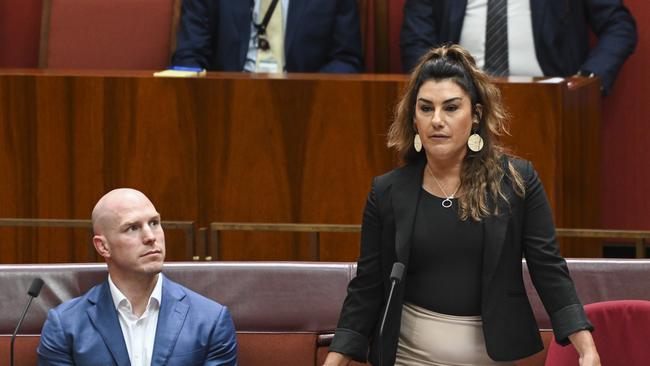Parties hold the power in defective system
The Senate is far from perfect but giving major parties more power to replace defecting senators is not the way to fix it. They should do a better job of vetting them in the first place.

Those wanting reforms include former attorney-general George Brandis and former Supreme Court judge Anthony Whealy, now chair of the Centre for Public Integrity. Australia’s most respected political journalist, this masthead’s editor-at-large, Paul Kelly, started the debate with a thoughtful opinion piece.
It’s a triumvirate worthy of respect, but I respectfully disagree with them. The law of unintended consequences sits front of mind as I consider the risks attached to forcing senators who defect out of parliament altogether, giving the party they previously represented the right to pick a replacement.
Australia already has one of the most robust party systems in the world, with entrenched two-party dominance imposing a level of party discipline seen in few other democracies. In the Labor Party it is written into its rules that if you cross the floor, even just once on a matter of conscience, you can be expelled. Even in the hyper-partisan world of US politics there are no guarantees that party-affiliated members of congress will vote on party lines.
Giving Australian political parties – which are private organisations exempt from freedom of information oversight – more power, not less, is likely to lead to perverse outcomes. Parties already exclude themselves from important oversight legislation such as privacy laws. This, for example, allows them to collect all manner of information about voters (without consent), which they store for campaigning purposes, fundraising and who knows what else.
Were political parties to be granted the power to expel senators who don’t conform to their wishes, in the full knowledge they would get to replace those contrarian senators, it’s hard to know where the erosion of individual rights in the name of the party collective might stop. It’s certainly not a rule change that brings liberalism closer to the heart of our parliament.
Were we to consider constitutional reform forcing senators to disengage from the party they were affiliated with at the time of the election, there would need to be rules that the decision wasn’t forced on the representatives by the party machine. Policing the grey in such a scenario would be difficult.
Kelly alluded to some of these downsides in his piece. But I worry he may have undercooked the threats to freedom and discretion within parties. Requiring any senator who might want to disentangle themselves from the party they were elected to represent to quit politics risks parties doing their darndest to force “troublemaking” representatives out. Especially in minor parties, which sometimes operate on the margins of politics.
Further, when we consider recent defections from parties among the Senate cohort, most have left minor parties rather than major parties. Those minor parties on occasion have been so minor that the departing senator was one of a handful or less of the party’s entire parliamentary team.
Whatever constitutes the organisational wing of such micro minor parties thereafter, deciding who might replace the exiting senator doesn’t bear thinking about. These organisations are often unprofessional, meaning the Senate could be trading one dud for a bigger one.
While this is already a risk when senators die or resign from parliament and get replaced – courtesy of the 1977 constitutional amendment – there is little alternative to such scenarios. They need replacing for the balance of the chamber. Having already let the concept of the political party into the Constitution with that amendment – as Brandis points out – is no reason to do so again for different reasons. There are already constitutional protections under this amendment. A senator who disaffiliates from the party they were elected to represent before resigning or dying must be replaced by a member of the party they were originally affiliated with. Not the subsequent party they established or joined.
Few Australians would be aware the 1977 amendment also remains untested in so far as it is possible a state legislature can reject a party’s preselected candidate, perhaps choosing its own candidate instead as long as that person is a member of the same political party the outgoing senator causing the vacancy was at the time of their election.
Frankly, if parties want to find a better way to manage the problem of senators defecting they should do a better job of vetting who they pick to represent the party in the first place. Or, as has also been the case when senators defect, parties should do a better job of sticking to their own promises and ideological footings, so senators who want to stand on principle don’t feel the need to walk away from the nomenclature they were affiliated with at the election. Breakups are a two-way street.
This latest debate has been sparked by former Greens senator Lidia Thorpe defecting over disagreements on the voice. But she was a well-known radical, including her ideas on Indigenous affairs, long before the Greens preselected her in Victoria. And, while the Senate system promotes the party over the individual, those running for office put their names on the ballot paper and their reputations on the line. In an age where the rights of the individual continue to be eroded, one more step in that direction feels unnecessary.
It’s not ideal when senators defect – given the Senate’s proportional representation system. Six-year terms can see relatively unknown defecting senators in the chamber for many years to come, perhaps controlling the balance of power. But further empowering minor parties with dysfunctional or unrepresentative membership bases to take over and pick a replacement is no solution. Besides, the balance of power is only powerful when major parties are at odds, suggesting a genuine split in mainstream opinion as the precondition.
If any rule change kept discontented maverick senators in the party tent that’s no solution either. It’s akin to forcing married couples to stay together by banning divorce. The unintended outcomes can be catastrophic.
At its core I worry about constitutional change that further erodes the power of the individual, much less a reform that also cedes greater power to political parties. It is especially concerning in the upper house of our bicameral system. The Senate is supposed to be a house of review. A check and balance on government power and lower house democracy. Are we honestly enhancing those powers and responsibilities by ceding more authority and control to political parties? It’s very hard to answer yes, even if we don’t like the sometimes lowbrow spectacle of crossbench defections and the shenanigans that ensue. The status quo is a lesser of evils to the change being proposed.
Peter van Onselen is a professor of politics and public policy at the University of Western Australia and Griffith University. His PhD dissertation was on the Australian Senate.







With a growing number of party-affiliated senators switching allegiances and continuing to serve in the upper house, curbing the practice has become a hot topic of debate.